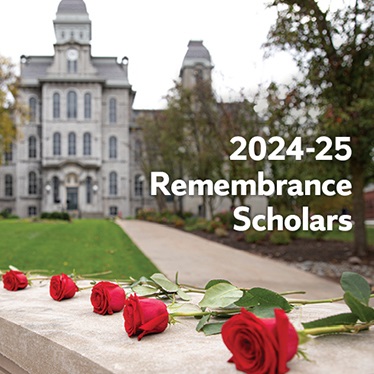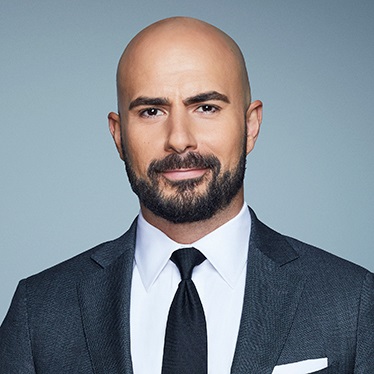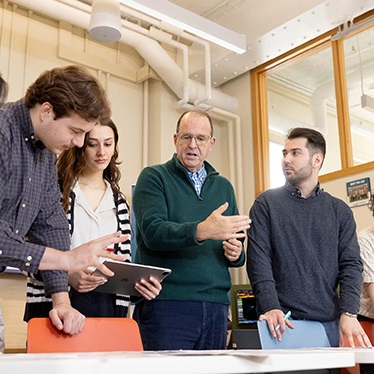Different Viewpoints, Better Solutions
August 6, 2019
CEPA is Syracuse University’s hub for interdisciplinary research in energy and environmental policy.
The seven northeastern U.S. states that make up the Regional Greenhouse Gas Initiative have set ambitious emissions reduction goals and renewable energy targets. But current use is not well documented. Little high-resolution data exists on exactly how homeowners in the Northeast use electricity.

“If you want to figure out policies to reduce energy, knowing how people use energy is in some ways the most important thing you can know,” says Peter Wilcoxen, professor of public administration and international affairs and the inaugural Ajello Professor in Energy and Environmental Policy.
That’s the impetus behind the Northeast Residential Energy Use Pilot Study, an interdisciplinary project between students and faculty in the Maxwell School, SU College of Law, SU’s iSchool, and the SU College of Engineering and Computer Science. The study will employ high resolution metering for long-term monitoring of electricity usage of individual households. “We’ll be able to monitor how much current people are using on every circuit in their house at one-minute intervals all year round,” says Wilcoxen.
“It’s impossible to address these issues without understanding them from multiple perspectives.”
The project, funded by a Syracuse University CUSE Grant for interdisciplinary study, is housed at the Maxwell School’s Center for Environ-mental Policy and Administration (CEPA), created in 1994 to link researchers in the social sciences with those in the natural sciences, engineering, and law to bring a broad interdisciplinary view to research and teaching on environmental issues. In addition to nurturing environmental research by faculty and students, CEPA serves as a hub for information regarding courses, lectures, fellowships, and grants related to the environment.
Environmental and energy issues are “deeply interdisciplinary, because they occur where social and natural systems meet,” says Wilcoxen, di-rector of CEPA and lead investigator on the pilot study. “It’s impossible to address these issues without understanding them from multiple perspectives. We need solutions that make sense technically on the engineering or scientific side but also on the economic side.”
Last fall, CEPA received a major boost from Maxwell School alumnus James Ajello ’76 MPA, whose $250,000 gift funded the new professorship and interdisciplinary research projects in that field.
With the Ajello funding, Wilcoxen’s mission is to expand interdisciplinary projects and relationships that extend out to the rest of the University. These projects not only address real-world problems but provide opportunities for students to get involved.
In March, Brian Ratcliffe, an MPA candidate also studying applied ecology at the SUNY College of Environmental Science and Forestry, took the lead in producing the Community Forum on Carbon Tax. The CEPA-sponsored event featured a panel of four expert speakers, small group conversations, and a Q&A.
“It’s a topic I am very passionate about,” says Ratcliffe, who hopes to work in environmental policy. “Environmental problems are inherently complex and multidimensional. Having a working understanding of economics, behavioral science, statistics, public administration, conflict studies, and tax policy — among other things — will be critical in helping to address issues like climate change, extinction, and resource scarcity.”CEPA researchers also draw from the expertise and industry connections of the University-sponsored Center of Excellence (CoE), which fosters collaboration between academia and industry to develop and commercialize new technologies, all in the realm of energy and environmental systems.
“They provide a very valuable connection to the private sector,” says Wilcoxen, a CoE faculty fellow. “Maxwell has lots of people who work with government and nonprofits, but not as many people associated with companies like Carrier or Corning. These are the types of collaborations I’d like to see CEPA get involved with.”
By Renee Gearhart Levy
This article appeared in the Spring 2019 print edition of Maxwell Perspective © Maxwell School of Syracuse University. To request a copy, email maxwellperspective@syr.edu.
Special Series: Environment, Energy, Sustainability
- Public Affairs and the Multifront Attack on Climate Change
- Top Priority
- Different Viewpoints, Better Solutions
- Climate Change in the Classroom
Outside Experts
Related News
School News

Apr 19, 2024
School News

Apr 18, 2024
School News

Apr 18, 2024
School News

Apr 17, 2024